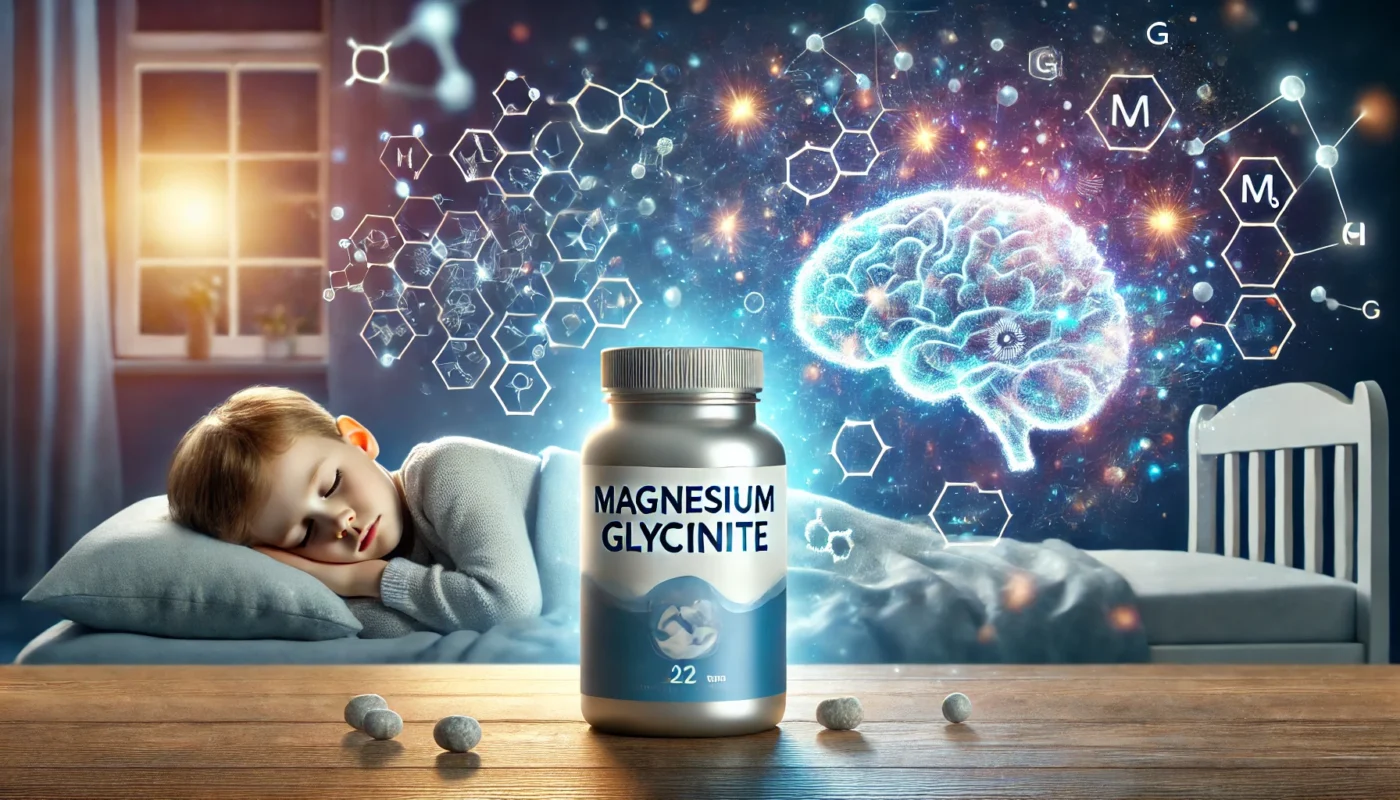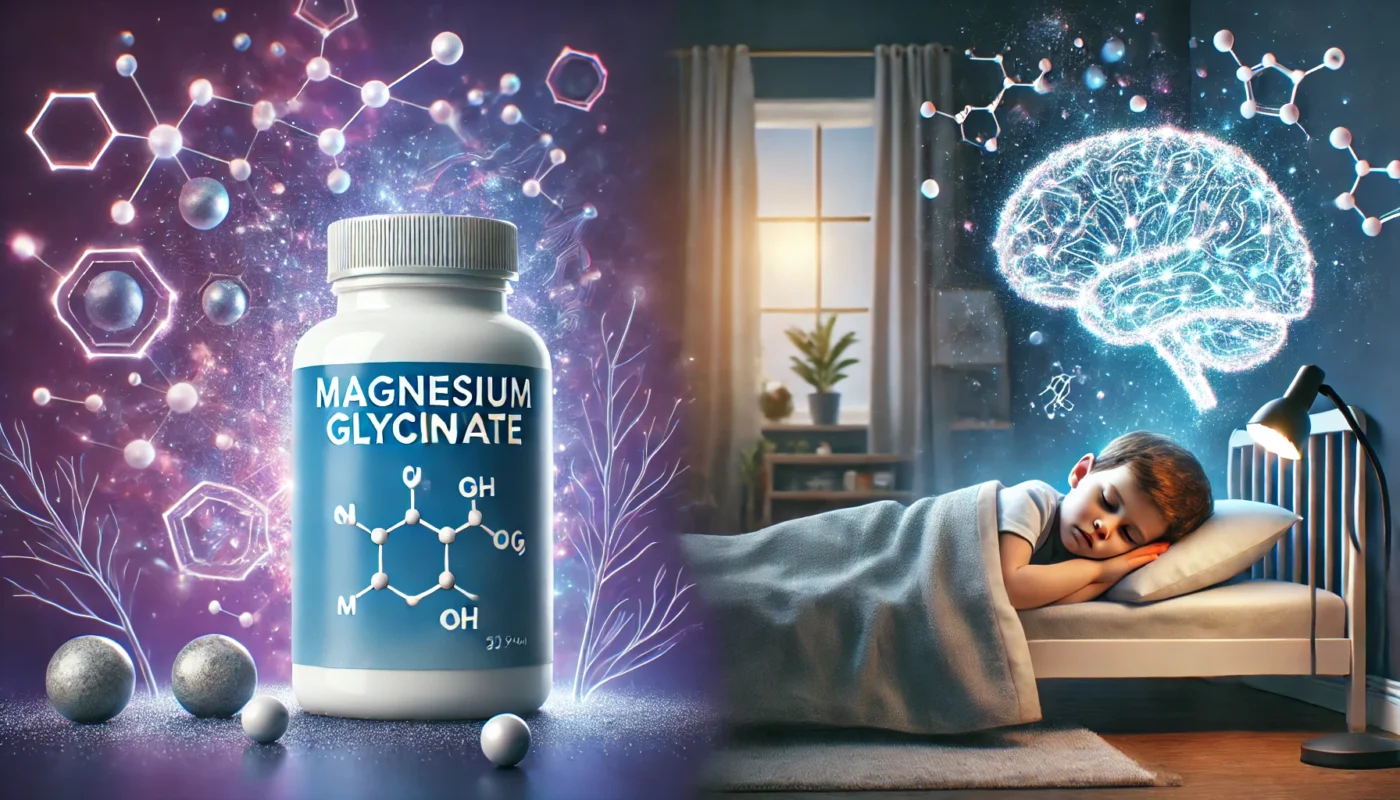Sleep is essential for children’s physical growth, cognitive development, and emotional well-being. Yet, many children experience sleep disturbances such as insomnia, restlessness, or difficulty staying asleep, which can negatively impact their health and behavior. Parents often seek safe and natural solutions, and magnesium glycinate is emerging as a promising option.
Magnesium glycinate, a bioavailable and gentle form of magnesium, may help promote healthy sleep patterns in children by calming the nervous system, reducing anxiety, and supporting overall relaxation. This article explores the science behind magnesium glycinate’s effects on sleep in children, reviews relevant research, and provides practical guidance for its use.
You May Also Like:
The Connection Between Magnesium Glycinate and Healthy Sleep Cycles
Magnesium Glycinate for Kids: Addressing Sleep and Focus Challenges
The Link Between Magnesium Glycinate and Healthy Sleep Patterns in Children is an original (HSLHealing) article.
Why Sleep Matters for Children
Children need significantly more sleep than adults to support their rapid physical and neurological development. The National Sleep Foundation recommends the following nightly sleep durations:
- Toddlers (1–2 years): 11–14 hours
- Preschoolers (3–5 years): 10–13 hours
- School-age children (6–13 years): 9–11 hours
Insufficient sleep in children can lead to a range of issues, including:
- Behavioral Problems: Irritability, hyperactivity, and difficulty concentrating.
- Learning Difficulties: Impaired memory and cognitive performance.
- Physical Health Risks: Compromised immune function and delayed growth.
Sleep disturbances in children are often linked to stress, anxiety, or an overactive nervous system, making magnesium glycinate a valuable tool for promoting relaxation and sleep.

The Role of Magnesium in Sleep Regulation
Magnesium is a vital mineral involved in over 300 biochemical reactions, many of which impact sleep. Key roles of magnesium in sleep regulation include:
- Enhancing GABA Activity
Magnesium supports the production of gamma-aminobutyric acid (GABA), a neurotransmitter that calms the brain and promotes relaxation. Low GABA levels are associated with insomnia and restlessness. - Regulating the Sleep-Wake Cycle
Magnesium influences the body’s circadian rhythm by supporting the production of melatonin, the hormone responsible for regulating sleep-wake cycles. - Reducing Stress and Anxiety
Magnesium helps lower cortisol, the body’s primary stress hormone, which can interfere with sleep when elevated. - Relaxing Muscles
Magnesium aids in muscle relaxation, helping children fall asleep more easily and stay asleep longer.
Despite its importance, magnesium deficiency is common, affecting up to 15% of children globally, according to a study in Pediatrics International (2017). Children with low magnesium levels are more likely to experience sleep disturbances.
Why Magnesium Glycinate for Children?
Magnesium glycinate is a chelated form of magnesium bound to glycine, an amino acid with calming properties. This formulation offers several advantages, particularly for children:
- High Absorption: Magnesium glycinate is highly bioavailable, meaning it is effectively absorbed and utilized by the body.
- Gentle on Digestion: Unlike some forms of magnesium (e.g., magnesium citrate), magnesium glycinate is less likely to cause gastrointestinal side effects such as diarrhea.
- Dual Benefits: Glycine enhances magnesium’s calming effects, further supporting relaxation and sleep.
How Magnesium Glycinate Supports Sleep in Children
1. Promoting Relaxation and Reducing Anxiety
Children who struggle with anxiety or an overactive mind often have difficulty falling and staying asleep. Magnesium glycinate’s calming effects stem from:
- Enhancing GABA Activity: By increasing GABA levels, magnesium calms neural activity, making it easier for children to relax.
- Reducing Stress Hormones: Magnesium lowers cortisol levels, preventing stress from interfering with sleep.
A clinical study in Nutrients (2019) found that magnesium supplementation reduced anxiety symptoms in children, leading to improved sleep quality.
2. Regulating Melatonin Production
Melatonin is essential for initiating and maintaining sleep. Magnesium glycinate supports melatonin synthesis by activating enzymes involved in its production.
- Research Insight: A study published in The Journal of Clinical Sleep Medicine (2018) demonstrated that children with sleep disorders who received magnesium supplementation experienced significant improvements in melatonin levels and sleep duration.
3. Alleviating Restless Leg Syndrome (RLS)
Restless leg syndrome, characterized by an irresistible urge to move the legs, can disrupt children’s ability to fall asleep. Magnesium glycinate may help by:
- Relaxing Muscles: Magnesium reduces muscle contractions and tension associated with RLS.
- Improving Nerve Function: Magnesium stabilizes nerve signaling, reducing the sensory disturbances of RLS.
A review in Sleep Medicine Reviews (2020) highlighted magnesium supplementation as a potential therapy for managing RLS symptoms in children.
4. Improving Sleep Quality
Magnesium glycinate enhances overall sleep quality by:
- Increasing Deep Sleep: Magnesium promotes restorative deep sleep stages, essential for growth and development.
- Reducing Nighttime Awakenings: By calming the nervous system, magnesium glycinate helps children sleep through the night.
A study in The Journal of Research in Medical Sciences (2012) found that magnesium supplementation improved sleep efficiency and reduced insomnia symptoms, particularly in children with anxiety-related sleep disorders.

How to Use Magnesium Glycinate for Children
1. Dosage Recommendations
The appropriate magnesium dosage for children varies by age and individual needs. General guidelines for elemental magnesium intake include:
- Toddlers (1–3 years): 80 mg per day
- Preschoolers (4–8 years): 130 mg per day
- School-age children (9–13 years): 240 mg per day
Magnesium glycinate supplements typically contain 10–14% elemental magnesium by weight. Consult a healthcare provider to determine the optimal dosage for your child.
2. Timing and Administration
- Evening Dosing: Magnesium glycinate is best taken 30–60 minutes before bedtime to promote relaxation.
- With Food: Taking the supplement with a meal can improve absorption and minimize potential side effects.
3. Combining with Other Sleep Strategies
Magnesium glycinate works best when paired with other sleep-promoting practices:
- Consistent Sleep Routine: Establish regular bedtime and wake-up times.
- Limit Screen Time: Reduce exposure to screens at least one hour before bed.
- Create a Calming Environment: Use dim lighting and calming activities, such as reading, before bedtime.

Potential Side Effects and Precautions
Magnesium glycinate is generally safe and well-tolerated, but excessive doses may cause mild side effects, such as diarrhea or stomach upset.
- Consult a Pediatrician: Always seek medical advice before starting magnesium supplementation, particularly if your child has a medical condition or is taking other medications.
- Monitor Total Intake: Ensure magnesium intake from food and supplements does not exceed the tolerable upper intake level (UL) for children:
- 65 mg/day for ages 1–3
- 110 mg/day for ages 4–8
- 350 mg/day for ages 9–18
Conclusion
Magnesium glycinate offers a safe, natural, and effective way to promote healthy sleep patterns in children. By calming the nervous system, regulating melatonin production, and reducing anxiety, this bioavailable form of magnesium addresses many underlying factors that disrupt sleep.
When combined with a consistent sleep routine and other lifestyle adjustments, magnesium glycinate can help children achieve the restful sleep they need for optimal growth and development. For parents seeking gentle and evidence-based solutions, magnesium glycinate is a valuable tool in the quest for better sleep.

References
- The effect of magnesium supplementation on primary insomnia in elderly: A double-blind placebo-controlled clinical trial. Retrieved from: https://pmc.ncbi.nlm.nih.gov/articles/PMC3703169/
- The effect of magnesium supplementation on primary insomnia in elderly: A double-blind placebo-controlled clinical trial. Retrieved from: https://pubmed.ncbi.nlm.nih.gov/23853635/
- Magnesium-L-threonate improves sleep quality and daytime functioning in adults with self-reported sleep problems: A randomized controlled trial. Retrieved from: https://www.sciencedirect.com/science/article/pii/S2590142724000193
- Magnesium supplementation beneficially affects depression in adults with depressive disorder: a systematic review and meta-analysis of randomized clinical trials. Retrieved from: https://www.frontiersin.org/journals/psychiatry/articles/10.3389/fpsyt.2023.1333261/full
- Magnesium depletion score and depression: a positive correlation among US adults. Retrieved from: https://www.frontiersin.org/journals/public-health/articles/10.3389/fpubh.2024.1486434/full
Important Note: The information contained in this article is for general informational purposes only, and should not be construed as health or medical advice, nor is it intended to diagnose, prevent, treat, or cure any disease or health condition. Before embarking on any diet, fitness regimen, or program of nutritional supplementation, it is advisable to consult your healthcare professional in order to determine its safety and probable efficacy in terms of your individual state of health.
Regarding Nutritional Supplements Or Other Non-Prescription Health Products: If any nutritional supplements or other non-prescription health products are mentioned in the foregoing article, any claims or statements made about them have not been evaluated by the U.S. Food and Drug Administration, and such nutritional supplements or other health products are not intended to diagnose, treat, cure, or prevent any disease.

